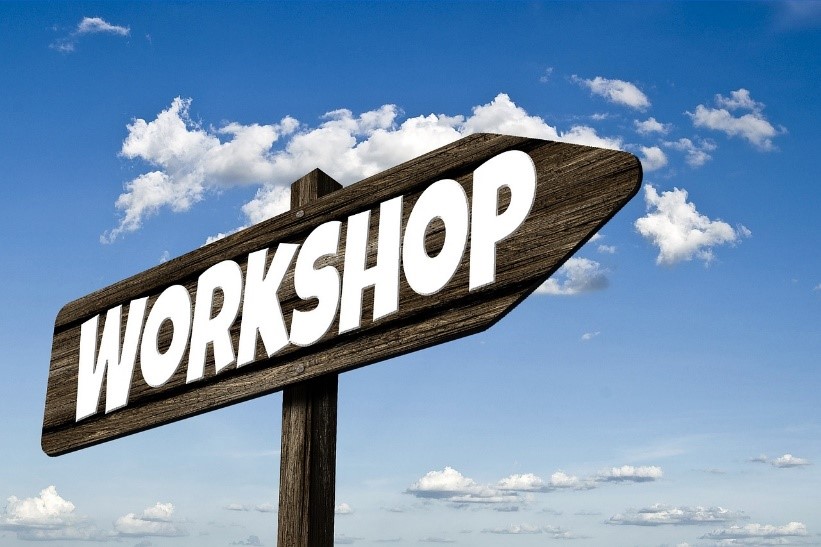Free workshop on accessibility in authoring tools
On 17 October 2019, ANEC is co-hosting a workshop with Funka on authoring tools able to comply with the Web Accessibility Directive. From 23 September 2019, public websites & apps have needed to be accessible for persons with disabilities under the provisions of the Web Accessibility Directive. The European Standard, EN 301549, can help meet this obligation, with authoring tools playing a key role in the design of accessible websites. The Brussels workshop is aimed at CMS producers, suppliers & providers, as well as standardisation experts. It will take place from 11h00-16h00. The workshop is free of charge, with lunch and networking breaks included. Online participation is possible, but since the workshop will be interactive and feature breakout groups, online participation will not offer the same experience. To participate, please register at https://bit.ly/2GjPY8K. The workshop is part of an EU-funded research project, We4Authors. For more on other workshops within the project, visit https://bit.ly/2kjv4PE. |
Lead story
ANEC President visits Czechia
ANEC President, Dermott Jewell, made a high-level visit to Prague in mid-September. He spoke at a national conference, ‘Will we be playing in a safe environment?’, about ANEC’s role in ensuring European playgrounds expose the youngest of consumers to only a safe level of risk, while allowing them to learn through play.
Later, the President presented an award to a playground operator in recognition of its commitment to safety.
The visit also encompassed a presentation to the Czech Consumers Association and its Cabinet for Standardization, in which Mr Jewell was accompanied by Libor Dupal, Chair of the Cabinet, and Czech member of the ANEC General Assembly. This was followed by a meeting with representatives of the Czech Ministry of Industry and Trade, UNMZ (Czech Office for Standards, Metrology & Testing) and ČAS (Czech Agency for Standardization). He also met with the Czech European Consumer Centre and ČOI (Czech Trade Inspection).
During these later meetings, the President stressed the importance to consumers of the effective market surveillance and enforcement of both regulations and standards. There was discussion of the new Regulation (EU) 2019/1020 on the compliance and surveillance of products in the Single Market.
Mr Jewell ended his meetings by reminding the authorities of the need to support consumer representation in national, European & international standardisation, noting the provisions of Regulation (EU) 1025/2012 on European standardisation.
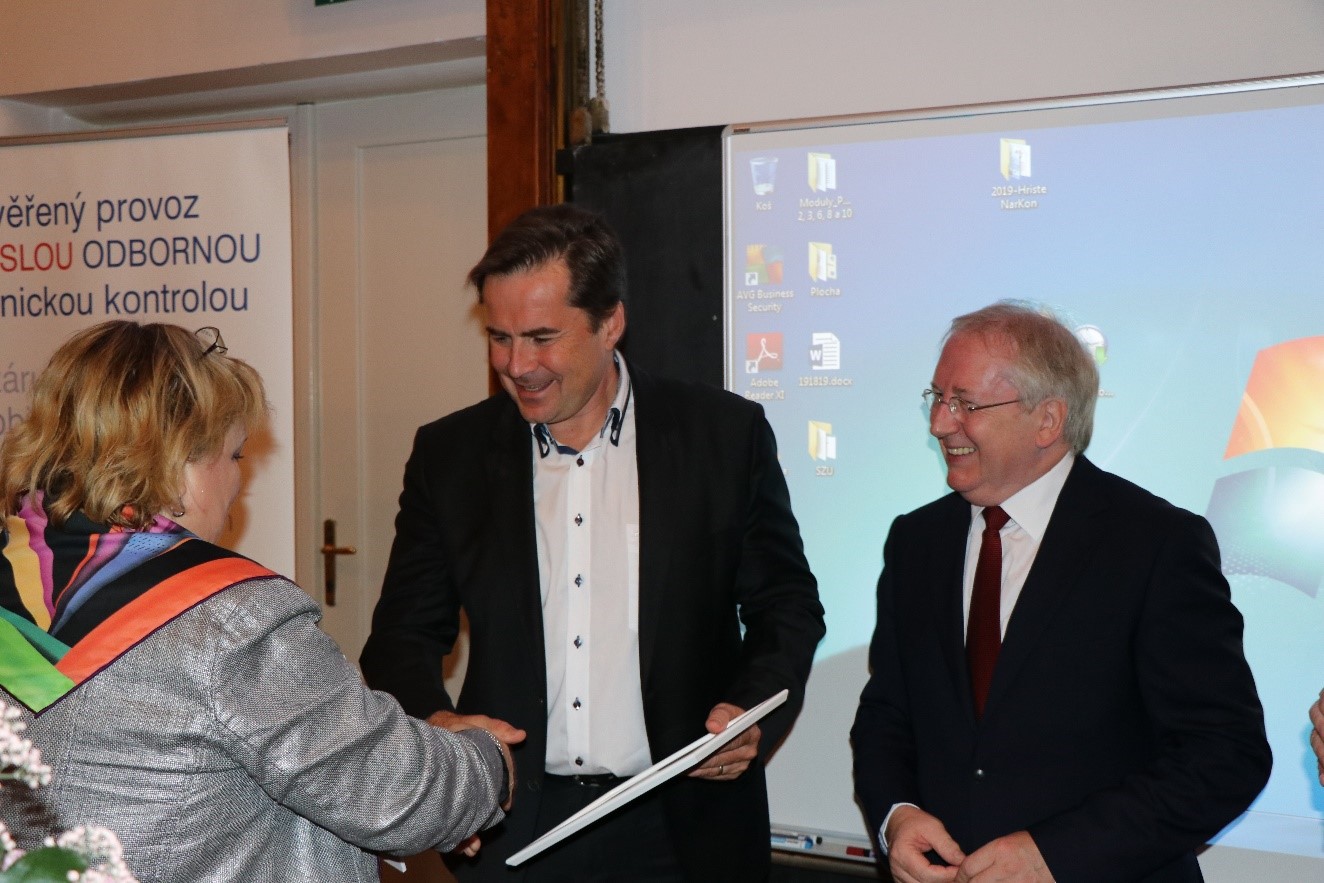
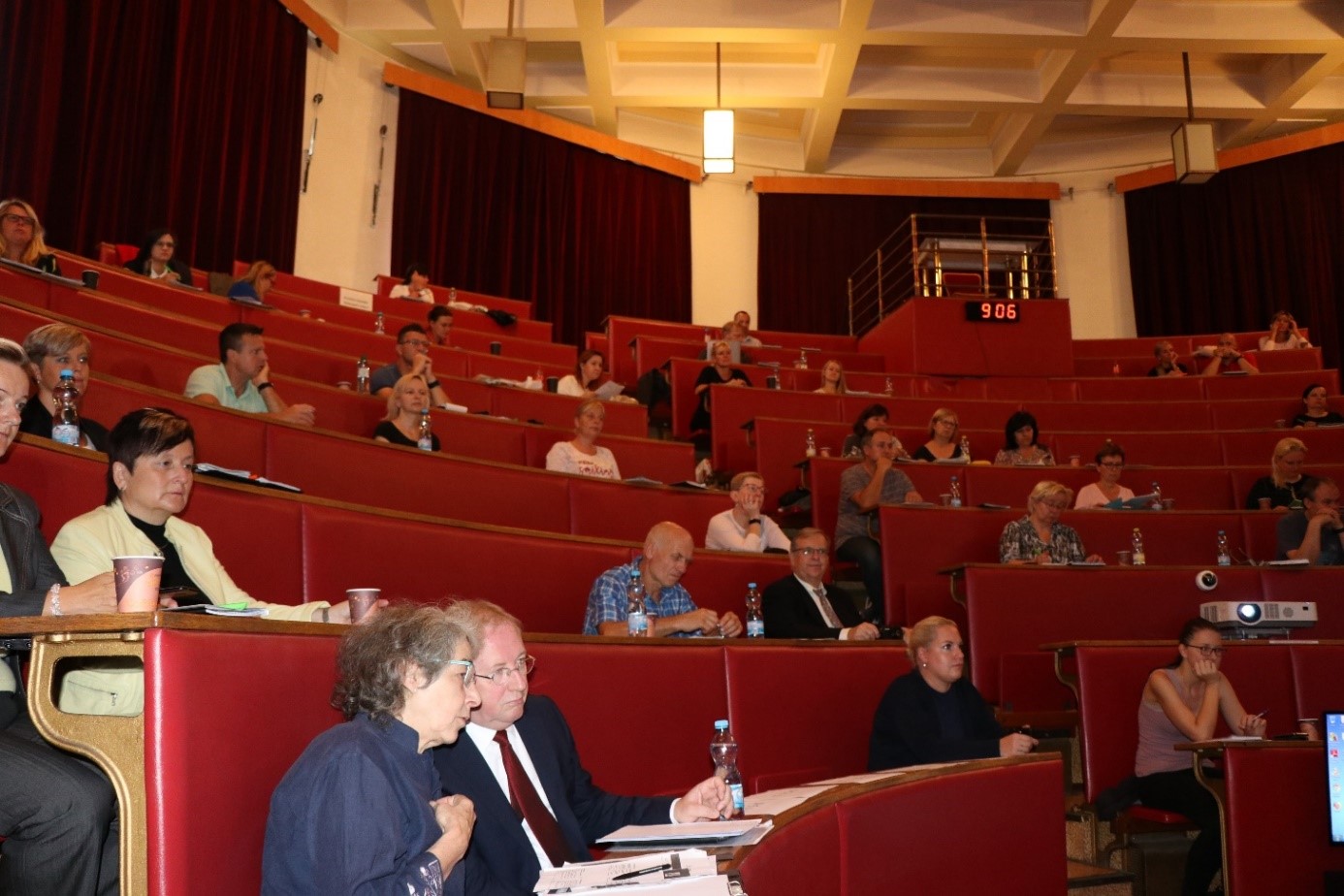
Horizontal stories
ANEC and CI refresh dialogue
On 4 October, ANEC was delighted to host a breakfast meeting with Helena Leurent, who took over as Director-General of Consumers International earlier this year. The meeting followed a high-level meeting in July between Ms Leurent and her ANEC, BEUC & ICRT peers, and was a first exchange on the future positioning of consumer representation in standardisation at the international level.
ANEC Vice-President, Jens Henriksson, in Brussels for other meetings, met Ms Leurent alongside Chiara Giovannini and Tania Vandenberghe from the ANEC Secretariat.
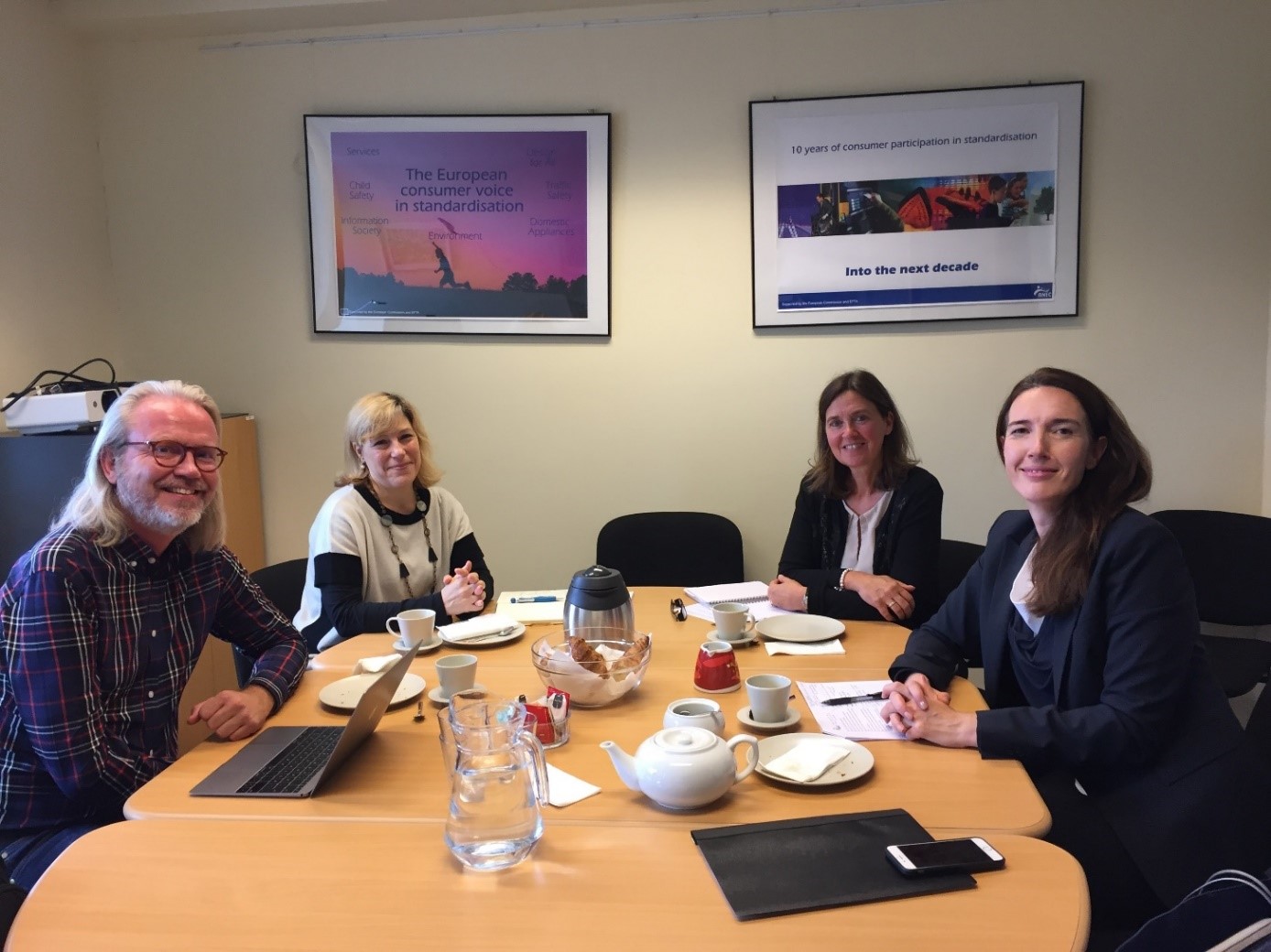
First EU Product Safety Awards
On 26 September, European Commissioner for Justice, Consumers & Gender Equality, Věra Jourová, announced the winners of the first edition of the EU Product Safety Awards, which focussed on children’s products. The Product Safety Awards reward businesses that make an added effort to protect consumers: those who put safety at the heart of what they do, going beyond the requirements of EU law.
In the afternoon, the winners shared their best practices with their industry peers and product safety experts. In the evening, the awards were formally presented to four SMEs and four larger companies from Austria, Denmark, Finland, Germany, Greece, Italy & the Netherlands. The ceremony was attended by key figures from the EU Institutions, consumer organisations and the media.
ANEC welcomes the initiative by DG JUST to create the Product Safety Awards to recognise companies that are doing exceptional work to keep their customers safe, beyond legal requirements and/or standards. We appreciate the use of softer measures to support regulation as a means to nudge the behaviour of both business and consumers. ANEC was honoured to be a member of the jury for the Awards. We hope the winners’ best practices will set an example to other manufacturers.
For more information about the Product Safety Award 2019 and the list of winners, please see here.
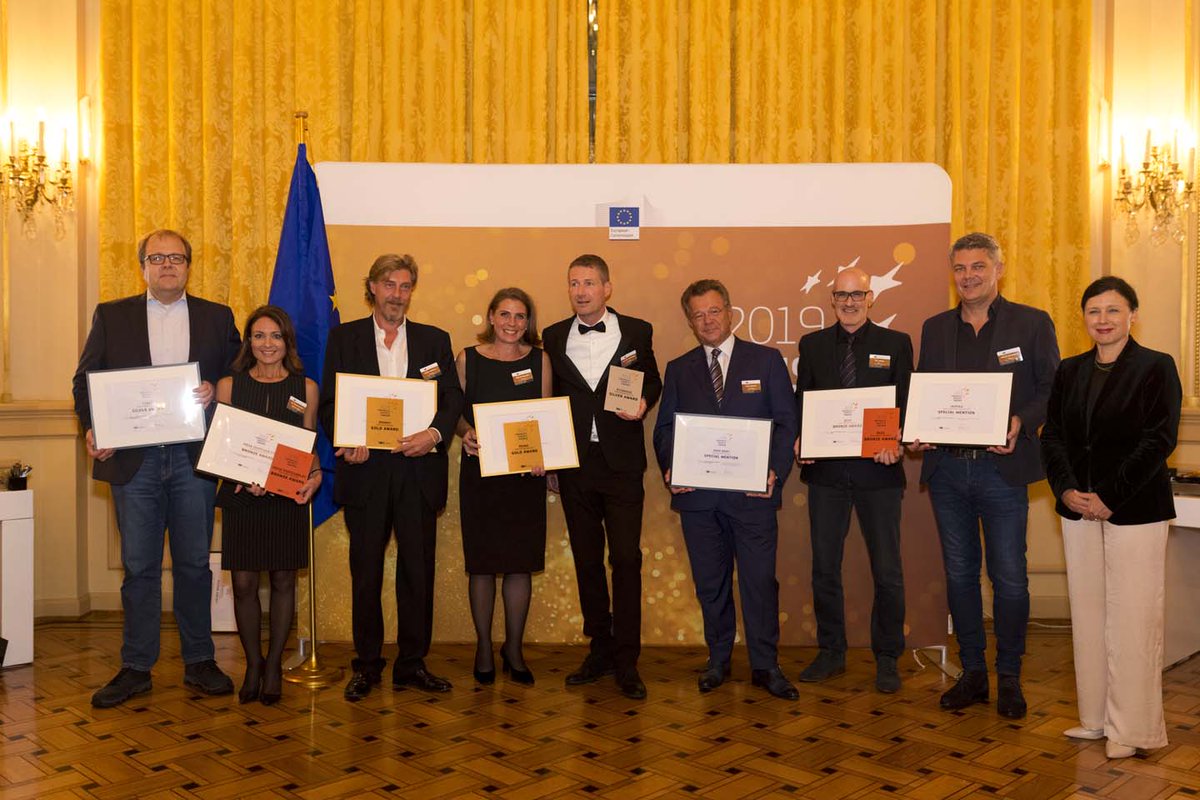
Joint Market Surveillance Actions 2016
The final conference of the joint market surveillance actions 2016 (‘JA2016’) was held in Brussels on 18 September. Tania Vandenberghe attended for ANEC.
JA2016, coordinated by PROSAFE, was supported financially by DG JUST to facilitate joint surveillance and enforcement actions among 31 European Product Safety Authorities, spanning a period of more than 2 years. During the morning, the results of the product activities under JA2016 were presented. ANEC was a stakeholder in the joint actions on baby carriers & cots; electric toys; impact drills and hair care appliances.
In the afternoon, Tania took part in a discussion panel, led by DG JUST, together with representatives from DG GROW, the European Parliament and industry. She spoke about ANEC involvement in the EU-financed Joint Actions over many years, and the lessons learnt for standardisation. The discussion centred on the future of multi-stakeholder co-operation, including the challenges of the new technologies, developing consistent approaches to risk assessment, and the importance of the availability of EU-injury data in setting priorities.
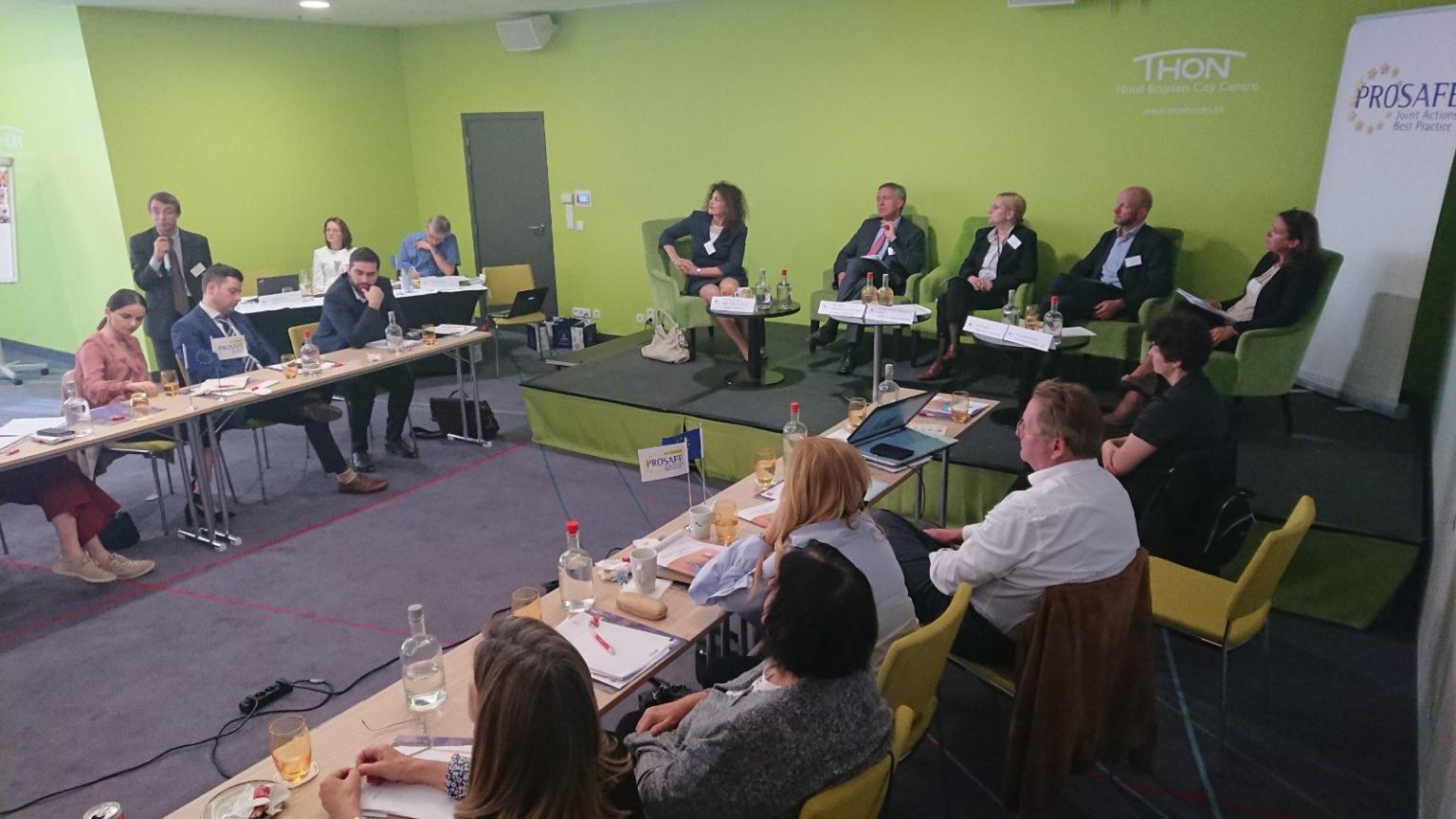
ANEC comments on draft EC Guidance
ANEC is pleased to have participated in an initial stakeholder consultation on the development of guidance on the practical aspects of implementing Regulation (EU) 1025/2012, the Standardisation Regulation. The development of the guidance was announced in the EC Communication on Harmonised Standards of November 2018.
Our comments focused on Standardisation Requests (SReqs) and procedure for resolving Formal Objections.
We believe there is need for a clear and precise definition of the temporal validity of SReqs. We are convinced an SReq ought to be maintained, even if not accepted by the European Standardisation Organisations (ESOs), or if no Harmonised Standards have been published, in order to be able to support market surveillance actions.
Regarding Formal Objections, we believe the present process takes too long. We also believe it can lead to misunderstandings among stakeholders (including the Member States and ESOs). Therefore, we suggest that deadlines for the procedure are set once a Formal Objection is introduced. In order to improve clarity, we propose a detailed template is developed for the lodging of the Formal Objection, with the specific points to be addressed (such as the identified shortcomings of the standard, any related accidents/injuries, suggested changes).
We think it could also be helpful if the ESOs would address these points with their international counterparts, when the Harmonised Standard is also an International Standard.
CEN-CENELEC meetings in the Basque Country
UNE, the Spanish national standards body, hosted the 88th meeting of the CEN Technical Board, the 163rd meeting of the CENELEC Technical Board, and common session of the two Boards, in Bilbao at the beginning of October. ANEC Secretary-General, Stephen Russell, participated in the three meetings and joined a visit of the CENELEC Technical Board to the Ormazabal electrical testing laboratories.
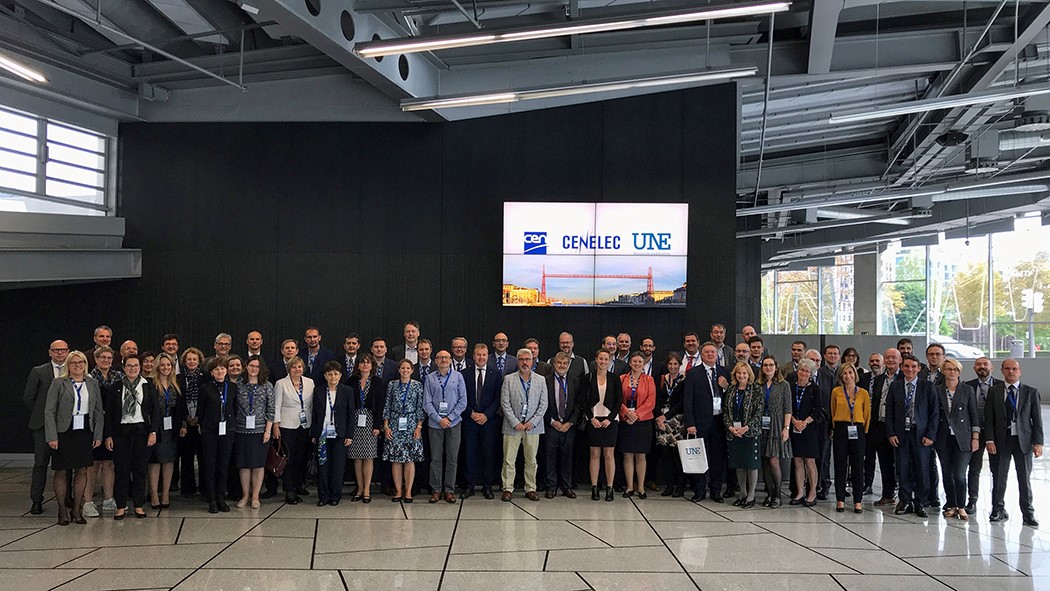
World Standards Day 2019
On October 14, ANEC joined the global standards community in celebrating World Standards Day. In light of this year’s theme, “Video standards create a global stage”, we celebrated by promoting videos that showcase our work on standards in various sectors. The video as a medium allows ANEC to explain the value of standards to consumers and wider stakeholders, and the importance of our role in representing the collective voice of European consumers.
Have you watched our videos on fuel identifiers and toy safety? If not, enjoy!
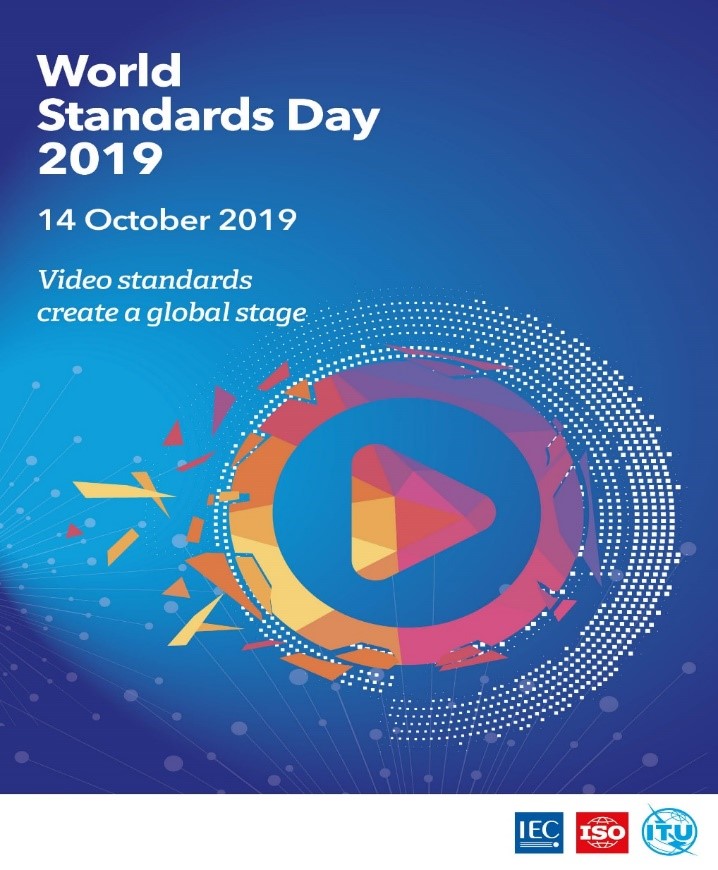
Child Safety
New guidance on toy safety
Two new guidance documents on toy safety were published in September by DG GROW. The EC and its Expert Group on Toy Safety draw up the guidance to assist authorities, economic operators and other stakeholders in the interpretation and application of the Toy Safety Directive 2009/48/EC. The guidance documents are not legally binding, but express the views of most of the Expert Group's members.
Guidance document N°18 on ‘Puffer balls and similar toys’ was established to aid the age classification of puffer balls, puffer figures, puffer animals and yo-yo balls.
Guidance document N°19 on ‘Soother holders’ aims to help differentiate between soother holders that are only soother holders and products that are soother holders and toys (i.e. those having a play function). EN 12568 covers all the requirements for soother holders, but those with a play function need also meet the requirements of the toy safety standard, EN 71-1.
ANEC contributed to the drafting of the guidance. The documents can be found at https://bit.ly/2sWkSPY.
Digital Society
ICT standards for the future
The Rolling Plan for ICT standardisation links EU policies and standards activities in the field of ICT and is complementary to instruments such as the Annual Union Work Programme (AUWP).
The Rolling Plan 2019 identifies 170 actions grouped into four thematic areas: key enablers & security, societal challenges, innovation for the single market, and sustainable growth. The EC has identified five priority domains — 5G, cloud, cybersecurity, big data and the internet of things (IoT) —where it considers ICT standardisation most urgent for completion of the digital single market
ANEC submitted comments on several consumer relevant actions in the Plan. We proposed new actions linked to the entry into force of the European Accessibility Act, and on artificial intelligence, Internet of Things, cybersecurity, and blockchain & distributed digital ledger technologies.
Connected products must not fail consumers
In December 2016, ANEC participated in a campaign to alert consumers and public authorities about the risks posed by connected products and toys. The campaign, #toyfail, was organised by the Norwegian Consumer Council with the support of BEUC and several national consumer associations.
It was based on the results of tests made on some connected toys (e.g. the Cayla doll). Internet-connected toys engage in ‘conversations’ with children by using built-in microphones and speech recognition technologies. The test results found spoken data, collected during the use of the toys, may be shared with third-parties. It is also possible to use a mobile phone to speak to a child through the toys, using a Bluetooth connection, with the link kept up to 20 metres away, so potentially putting the child at risk. Similar results were obtained when testing smart-watches (campaign #WatchOut).
ANEC presented the results at the EC TCAM Committee, calling on Member States to support the adoption of delegated acts to cover issues related to the safety of radio equipment in order to ensure that the personal data and privacy of the user and of the subscriber are protected.
Several Member States supported the initiative, including the Netherlands which made available the results of tests made on smart consumer products that show the fundamental lack of security of baby monitors and connected toys.
We therefore welcomed the public consultation on such delegated acts launched by the EC over the summer. Together with BEUC, we support the adoption of a delegated act pursuant to both Articles 3(3)(e) and (f) of Directive 2014/53/EU. We also think Article 3(3)(d) should be taken into account.
The new mandatory essential requirements would be implemented by Harmonised Standards to which ANEC would contribute. It is essential to have a legal basis which allows for non-compliant products to be removed from the market if such products do not respect the essential requirements needed to access the market. Only in this way can safety, personal data protection and security be delivered for consumers.
Eco-design
New Ecodesign rules for five household appliances
The European Commission has adopted Ecodesign measures for five main product groups, i.e. washing machines, dishwashers, fridges, electronic displays & lighting products, following the publication of the energy label requirements for the same products.
ANEC & BEUC welcome the package as it reflects some of our long-standing asks, both on resource efficiency and safety. The Energy Label for these product groups is rescaled and returns to the well-understood A-G scale. We believe however, that many requirements could have been more ambitious e.g. delivery time for spare parts. Moreover, certain spare parts will be made available only to professional repairers (not end users). In addition, durability as such is not directly addressed in the package.
See the BEUC and ANEC press release.
Sustainability
ANEC at Citizens’ Energy Forum
Hosted annually by the European Commission, together with the Commission for Regulation of Utilities (CRU) - Ireland’s independent energy & water regulator - the Forum focuses on the role of consumers in the evolving energy market.
ANEC has been contributing to the drafting of European standards on the reliability, accuracy, performance and interoperability of smart meters. Nevertheless, we believe added steps should be taken to ensure the protection of personal data.
ANEC’s Italian member, Marino Melissano, attended this year’s Forum in Dublin. Discussions indicated the importance of a clear and stable regulatory framework, the need to aggregate projects and services, and the role that could be played by standards and labels, particularly in developing sustainability benchmarks. Above all, it was stressed that consumers need help in navigating the complexity of the energy market, notably in the context of the circular economy.
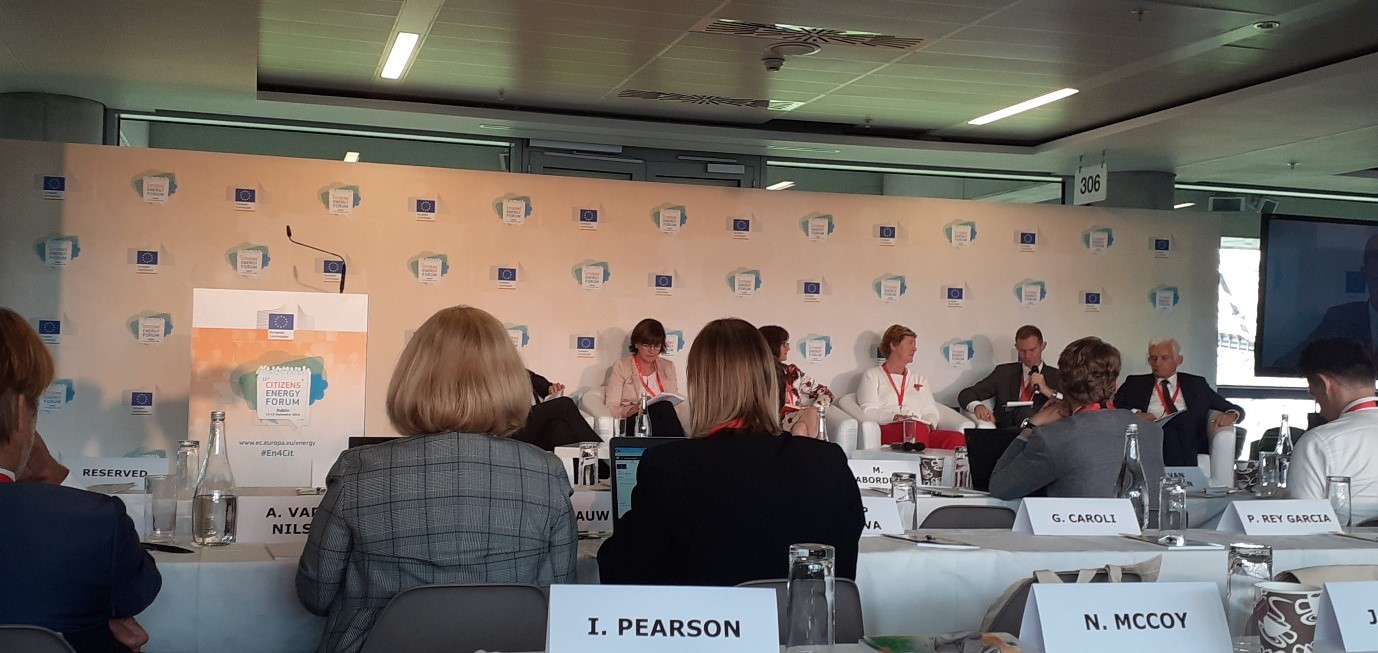
Webinar on CEN Guide 16
Those involved in standardisation of consumer-relevant articles are encouraged to read and apply CEN Guide 16 ‘Guide for addressing chemicals in standards for consumer-relevant products’.
CEN-CENELEC has published a webinar on the application of CEN Guide 16 ‘Guide for addressing chemicals in standards for consumer-relevant products’. The video, of about 15 minutes, guides the viewer through a clear summary of CEN Guide 16 and adds tips on how to use it.
Viewers can send questions arising from the webinar to This email address is being protected from spambots. You need JavaScript enabled to view it. until 20 December 2019 (an extended deadline).
Franz Fiala, the Austrian member of ANEC and Chair of the ANEC Chemicals PT, contributed extensively to the video. He was a project leader on behalf of the VKI office of Consumer Council at ASI, and had a key role in conceiving the Guide.
Traffic & Mobility
CORRECTION
Please note our previous Newsletter (edition 7) included an incorrect reference to “GRSP”. The reference should have been to the Working Party on Passive Safety, a subsidiary body of the World Forum for Harmonization of Vehicle Regulations (WP 29) under UNECE. See https://bit.ly/2ONYthp. Our apologies.
Vehicle data & cybersecurity
This October, a new subgroup of the EC Working Group on Motor Vehicles (MVWG) has been created dedicated to work on ‘access to vehicle data and cybersecurity’. ANEC is active in the MVWG but sees this new subgroup as a key opportunity for further involvement, especially as regards the implementation of type-approval legislation on repair and maintenance services through wireless connection.
News from ANEC Members
Support of accessible meetings in the Czech Republic
At the beginning of 2019, ISO 17069 Accessible Design - Considerations and assistive products for accessible meetings was introduced into the national portfolio of Czech Standards (CSN). Subsequently, an e-leaflet was prepared to inform stakeholders and encourage use of the standard.
The Czech Agency for Standardization (CAS), an organisation established by the Czech Office for Standardization, Metrology and Testing (the Czech member of ISO & ISO/COPOLCO), is responsible for the development of standards and administration of the CSN national system. Both the above-mentioned tasks were prepared by the Cabinet for Standardization. The Cabinet is a public service company founded by the Czech Consumer Association with a view to develop and implement specific tools and ways to involve Czech consumers in standardisation. The fact that CAS entrusted this contractual assignment to the Cabinet reflects its intention to support consumer participation in standardisation. The Cabinet also translated the national adoption of ISO 17069 into Czech.
ISO 17069 defines requirements and good practice related to preparing and hosting meetings so that the organiser does not neglect, as far as possible, any aspect that would cause problems of access. Given that all persons should have the right to attend and participate in meetings, the standard provides a valuable resource in removing obstacles to participation. The Czech consumer movement therefore welcomes the initiatives taken to raise the awareness and use of EN 17069 at the national level.
| List of meetings 2019 |
For comments or if you wish to write an article for the ANEC Newsletter, please contact: Marijana ANTAROROVA (This email address is being protected from spambots. You need JavaScript enabled to view it.).
